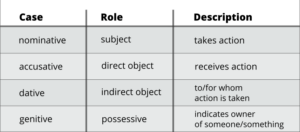Accusative in German

Learning what the German accusative case is (and how and when to use it) is essential. Since it’s not a grammar topic we really deal with in English, it might seem hard (or even dumb) at first.
Wouldn’t it be nice if you could learn a new language and not have to do so much work with grammar?
Even those of us who are grammar nerds can find it a bit overwhelming at times, so I know all the grammar mumbo-jumbo can get painful really fast for the rest of you.
Unfortunately, you must learn at least the key grammar points if you want to speak German with any proficiency whatsoever. There’s just no way around it.
That said, I know you can do it! You can learn the most important things (and forget the rest) and it doesn’t even have to be so bad. Promise.
What is the Accusative in German?
The accusative case can also be called the direct object case because it’s used whenever we talk about direct object.
Take a quick look at this overview of the 4 cases, the roles they signify, and what those roles do in a sentence (i.e. how they relate to each other):

A direct object is a person or thing that receives action from the subject.
I mow the grass.
He plants a garden.
You water the flowers.
You might find it really helpful to think of sentences as having ‘slots’ that we either have to (or optionally may) fill in:
subject + verb + direct object
If that resonates with you, then think of it like this: in any sentence, we have to fill up the ‘subject slot’ (nominative) first. There needs to be someone or something that will do something.
The next slot is then the verb — what the subject is doing.
Then, if there is additional information needed (or just wanted), we default to putting that word (or phrase, i.e. a collection of words) into the ‘accusative slot’.
So, with our example of I see the tree, I could have just a simple subject + conjugated verb, which is the most basic sentence possible: I see.
BUT I wanted to tell you WHO or WHAT I am seeing (who or what is the ‘recipient’ of my action of seeing), which is why I filled in the direct object (accusative) slot next: the tree.
Accusative in German
| English | German |
|---|---|
| I see the bird. | Ich sehe den Vogel. |
| He is reading the book. | Er liest das Buch. |
| She is eating the apple. | Sie isst den Apfel. |
| We are buying the flowers. | Wir kaufen die Blumen. |
| Have you seen the movie? | Hast du den Film gesehen? |
| I am visiting my friend. | Ich besuche meinen Freund. |
| The teacher is teaching the students. | Der Lehrer unterrichtet die Schüler. |
| He likes the coffee. | Er mag den Kaffee. |
| I hear the music. | Ich höre die Musik. |
| We wrote the letter. | Wir haben den Brief geschrieben. |
| She is wearing the dress. | Sie trägt das Kleid. |
| The waiter is serving the food. | Der Kellner serviert das Essen. |
| He knows the way. | Er kennt den Weg. |
| She is looking for the key. | Sie sucht den Schlüssel. |
| We missed the train. | Wir haben den Zug verpasst. |
| He is opening the door. | Er öffnet die Tür. |
| She baked the cake. | Sie hat den Kuchen gebacken. |
| The students are doing the homework. | Die Schüler machen die Hausaufgaben. |
| I loved the movie. | Ich habe den Film geliebt. |
| The doctor is examining the patient. | Der Arzt untersucht den Patienten. |





























